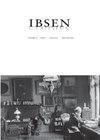Sublimation leads to sublime drama. Or, if you don’t have sex you may become a great writer
IF 0.6
0 THEATER
引用次数: 0
Abstract
A Critique of Jørgen Haugan’s Dommedag og djevlepakt. Henrik Ibsens forfatterskap – fullt og helt [Doomsday and Devil's Pact. Henrik Ibsen's work Fully and Wholly.] Jørgen Haugan’s magisterial and long (607 pages) new book on Ibsen (Haugan 2014) sums up his lifelong engagement with the playwright. Over the years, Haugan has written extensively on Ibsen in articles but not least in his two previous books Henrik Ibsens metode (1977) and Diktersfinxen. En studie i Ibsen og Ibsenforskningen [Doomsday and Devils Pact. Henrik Ibsen’s Work – not in Parts and Pieces] (1982). Both of these serve as a background to the present study. Haugan elaborates upon arguments first put forward in these earlier works in the new book, which he characterises as his last contribution to the field. I have always held a certain respect and fascination for Jørgen Haugan. He has been an odd man out in the Ibsen field, particularly in a Norwegian context. His close relationship to the milieu around the charismatic professor Aage Henriksen (1938–2011) at the University of Copenhagen taught him a different approach to Ibsen and also to view literature and literary scholarship from other perspectives than those that have been prominent in Norway. In addition, I have liked his often contrarian and self-assured attitude to what has been the accepted way of looking at the great works of Norwegian literature, not least demonstrated by his book on Knut Hamsun from 2004 – Solgudens fall. This being said, I was also during my reading of Dommedag og djevlepakt frequently irritated and in vehement disagreement both by his analyses and his methodological and theoretical approach, despite often finding many aspects of his concrete examinations of the dramas insightful. In the programmatic brief foreword to the book, Haugan states some principles that guides his reading. The first is that he will升华带来崇高的戏剧。或者,如果你不做爱,你可能会成为一个伟大的作家
Jørgen Haugan的《Dommedag og djevlepakt》批判。亨利克·易卜生:《世界末日》和《魔鬼契约》。亨里克·易卜生的作品。约翰·豪根(j . rgen Haugan)关于易卜生的长篇权威新书(607页)总结了他与剧作家易卜生的一生。多年来,豪根写了大量关于易卜生的文章,尤其是在他之前的两本书《亨利克·易卜生的方法》(1977)和《Diktersfinxen》中。我学习易卜生和易卜生的《世界末日》和《魔鬼契约》。亨里克·易卜生的作品——不是零零碎碎的)(1982)。这两者都是本研究的背景。豪根在新书中详细阐述了这些早期作品中首次提出的论点,他将其描述为他对该领域的最后贡献。我一直对约翰·豪根怀有某种敬意和迷恋。在易卜生油田,尤其是在挪威的背景下,他一直是一个怪人。他与哥本哈根大学富有魅力的教授Aage Henriksen(1938-2011)周围的环境有着密切的关系,这让他对易卜生有了不同的看法,也让他从不同的角度看待文学和文学奖学金,而不是那些在挪威很突出的观点。此外,我还喜欢他一贯的特立独行和自信的态度,这种态度已经被公认为是看待挪威文学伟大作品的方式,尤其是他2004年写的关于克努特·哈姆生的书——《索尔古登斯的坠落》。话虽如此,在阅读Dommedag djevlepakt时,我也经常被他的分析、方法论和理论方法所激怒和强烈反对,尽管他对戏剧的具体研究在许多方面都很有见地。在这本书的纲领性简短前言中,豪根陈述了一些指导他阅读的原则。首先,他会这么做
本文章由计算机程序翻译,如有差异,请以英文原文为准。
求助全文
约1分钟内获得全文
求助全文

 求助内容:
求助内容: 应助结果提醒方式:
应助结果提醒方式:


